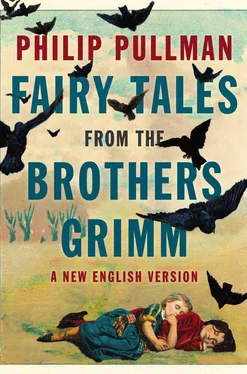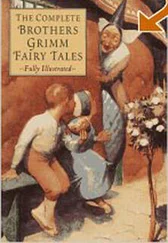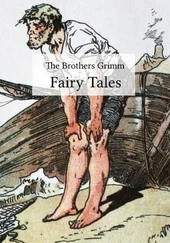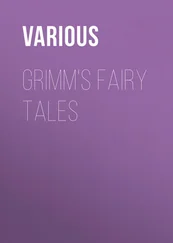Simon Sechter, who originally recorded this tale, was a composer and teacher of music from Weitra in Lower Austria, and the Grimms transmitted it in the dialect version in which it came from him:
Is is emohl e Mon gewön, der hot ninx us g’spielt, und do hobend’n d’Leut nur in ‘Spielhansl’ g’hoaßen, und wal er gor nit afg’hört zen spielen, se hot e san Haus und ullss vespielt.
One of the Grimms’ first impulses towards collecting folk tales was, of course, due to their philological interest in the varieties of the German language. It’s debatable whether we should present this tale, and perhaps ‘The Fisherman and His Wife’ and ‘The Juniper Tree’, in some dialectal variety of English to try and imitate what they are like in German. My feeling is that if anyone is really interested in that aspect of language, they would probably rather look at the original than at some laborious attempt to replicate its effect, and that most readers who want an English version would prefer to read one that presents as few obstacles as possible.
The other thing to say about this tale is that it’s lively, swift and ludicrous.
THIRTY-FOUR
THE SINGING, SPRINGING LARK
Once upon a time there was a man who was about to set off on a long journey. Before he left he asked his three daughters what they’d like him to bring back for them. The oldest daughter wanted pearls, the second asked for diamonds, and the youngest said, ‘Dear father, I’d like a singing, springing lark.’
The father said, ‘If I can find one, you shall have it.’
Then he kissed all three and set off. In the course of his journey he bought pearls and diamonds for the two eldest daughters, but he searched everywhere without success for a singing, springing lark. He was unhappy about that, because the youngest daughter was his favourite.
As it happened, his road led him through a forest, in the middle of which stood a magnificent castle. Near the castle was a tree, and right at the top of the tree there was a lark, singing and springing.
‘You’re just what I wanted,’ he said, and he told his servant to climb the tree and catch the little bird.
But as the servant approached the tree, a lion leaped out from under it, shook himself, and roared till every leaf on the tree trembled.
‘If anyone tries to steal my singing, springing lark,’ cried the lion, ‘I’ll eat them up.’
‘My apologies,’ said the man. ‘I didn’t know the bird belonged to you. Let me make it up to you. I’ll give you gold if you spare our lives.’
‘Gold is no good to me,’ said the lion. ‘I want whatever first comes to meet you when you arrive home. Promise me that, and you can have your life, and your daughter can have the lark as well.’
At first the man refused. ‘The first to meet me could be my youngest daughter,’ he said. ‘She loves me the most, and she always runs out to greet me when I get home.’
‘But it might not be her!’ said his servant, who was frightened. ‘It might be a dog or a cat!’
The man let himself be persuaded. He took the singing, springing lark, and promised to give the lion whatever came to meet him first when he arrived home.
And when he got home and entered his house, the first to come and greet him was none other than his youngest, dearest daughter. She came running, kissed and hugged him, and when she saw that he’d brought a singing, springing lark for her, she was beside herself with joy.
Her father couldn’t be glad, though, and he began to weep.
‘My dearest child,’ he said, ‘this little bird cost me dear. To get it I had to promise to give you to a wild lion, and when he gets you, he’ll tear you to pieces and eat you.’
He told her everything that had happened, and begged her not to go to the lion, come what may.
But she consoled him and said, ‘Dearest father, we must keep your promise. I’ll go there and pacify the lion, and come back safe and sound.’
Next morning her father showed her the way, and she set off confidently into the forest.
Now in fact the lion was an enchanted prince. During the day he and all his courtiers had the form of lions, but at night they turned back into human beings. When the girl reached the castle it was nightfall, and they welcomed her courteously. The prince was a handsome man, and soon their wedding was celebrated with great splendour and rejoicing. Because of the enchantment he was under, they slept all through the day, and stayed happily awake at night.
One day her husband said to her, ‘Tomorrow your elder sister is getting married, and there’s going to be a feast at your father’s house. If you like, my lions will take you there.’
She said that she’d be glad to see her father again, so she set off, accompanied by the lions. There was great joy when she arrived, because they all thought that she’d been torn to pieces and was long dead, but she told them all about her handsome husband and the life they spent together. She stayed until the wedding celebrations were over, and then she went back to the forest.
When the second daughter got married she was invited again, and she said to the lion, ‘I don’t want to go on my own this time. I’d like you to come with me.’
The lion said that it would be very dangerous. If a ray of light fell on him, even the light of a single candle, he would be changed into a dove, and he would have to fly away with the doves for seven years.
‘Oh, please come!’ she said. ‘I’ll protect you. I’ll keep every ray of light from you, I promise.’
He was persuaded, and off they went, taking their small child with them. At her father’s house she had a special room built, with thick walls and no windows at all. When the wedding lights were lit he was to stay in the room for safety, but the builders had made the door out of unseasoned wood, and after it was hung it split and developed a tiny crack, which no one noticed.
The wedding was celebrated with great joy, and the procession set out from the church to the bride’s father’s house. Torches flared and lanterns shone, and as they went past the prince’s room, a single ray of light no wider than a hair shone through and touched him. And when his wife came in looking for him, she didn’t see him: all she found was a white dove.
The dove said, ‘I must fly about the world for seven years. But every seven steps, I’ll drop a white feather and a drop of blood to show you where I’ve gone. If you follow the trail you’ll be able to save me.’
The dove flew out of the door, and she followed him at once. As he’d said, every seven steps a white feather and a drop of blood fell to show her the way.
She followed him further and further away, out into the wide world far from home. Thinking of nothing else but following him, she didn’t look aside, and didn’t rest until the seven years were nearly up. All that time she hoped that she would soon save him, but she was wrong: because one day as she was walking on, no feather fell, and no drop of blood either. She looked up, but the dove had vanished.
‘Well, no human being can help me now,’ she said, and so saying, she climbed right up to the sun.
‘Sun,’ she said, ‘you shine over every mountain, and into every crack and cranny. Have you seen my little white dove flying past?’
‘No,’ said the sun, ‘I haven’t seen your dove, but I’ll give you this casket. Open it when you’re in great need.’
She thanked the sun and went on her way till night came and the moon was shining. She said to the moon, ‘Moon, you shine all night on the fields and the forests. Have you seen my little white dove flying past?’
‘No,’ said the moon, ‘I haven’t seen your dove, but I’ll give you this egg. Break it open when you’re in great need.’
Читать дальше












